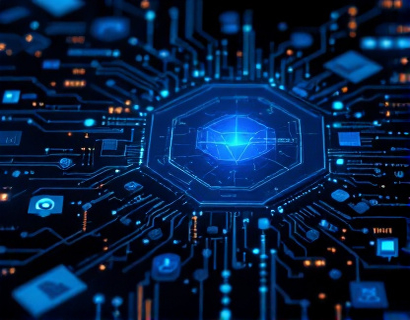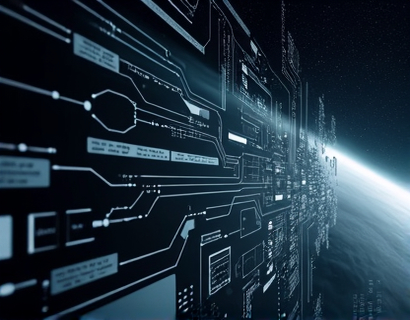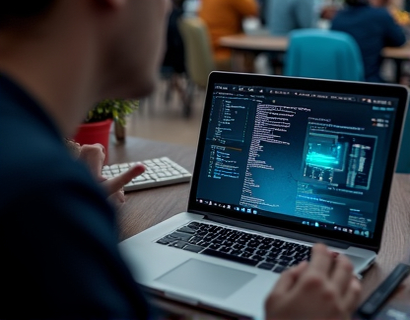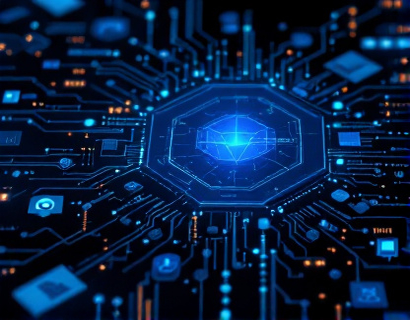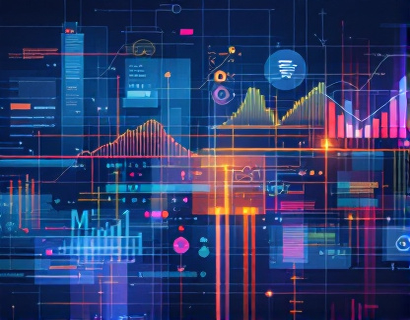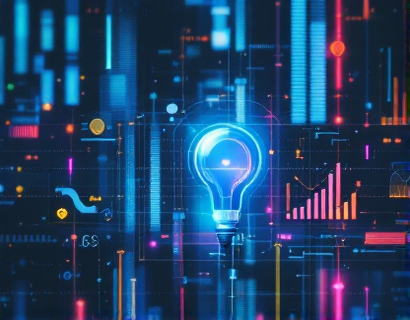Decentralized Productivity: Unleashing the Power of AI and Crypto for Next-Gen Business Efficiency
The intersection of artificial intelligence and cryptocurrency is giving rise to a new paradigm in business efficiency, one that promises to revolutionize how we approach productivity and digital collaboration. This emerging field, often referred to as decentralized productivity, harnesses the strengths of both technologies to create advanced tools that are not only more efficient but also more secure and transparent. For tech innovators and early adopters, understanding this convergence is crucial for staying ahead in a rapidly evolving digital landscape.
Decentralized productivity tools are built on blockchain technology, which provides a distributed ledger that ensures data integrity and security without the need for a central authority. When combined with AI, these tools can automate complex tasks, analyze vast amounts of data, and provide insights that would be impossible for humans to process manually. This synergy is redefining the way businesses operate, offering unprecedented levels of efficiency and collaboration.
Understanding Decentralized Productivity
At its core, decentralized productivity refers to the use of decentralized applications (dApps) and smart contracts to enhance various aspects of business operations. These dApps run on blockchain networks, ensuring that all transactions and data exchanges are transparent, immutable, and tamper-proof. This level of transparency is crucial for building trust among collaborators and stakeholders, which is often a significant barrier in traditional centralized systems.
AI, on the other hand, brings the power of machine learning and natural language processing to these decentralized tools. By integrating AI, dApps can perform tasks such as predictive analytics, automated reporting, and even real-time language translation, making cross-border collaboration seamless. The combination of these technologies creates a powerful ecosystem where data is not only secure but also intelligently processed and utilized.
Key Components of Decentralized Productivity Tools
To fully understand the potential of decentralized productivity, it's essential to break down the key components that make these tools effective:
- Blockchain Technology: The foundation of decentralized productivity, blockchain ensures that all data and transactions are recorded in a secure and transparent manner. This eliminates the need for intermediaries, reducing costs and increasing efficiency.
- Smart Contracts: Self-executing contracts with the terms directly written into code, smart contracts automate processes and ensure that agreements are enforced without the need for manual intervention.
- Decentralized Storage: Services like IPFS (InterPlanetary File System) provide a decentralized alternative to traditional cloud storage, ensuring data is distributed across multiple nodes and is less vulnerable to censorship or failure.
- AI Integration: Machine learning algorithms can analyze data stored on the blockchain, providing insights and automating tasks that would otherwise require significant human effort.
These components work together to create a robust framework for decentralized productivity, enabling businesses to operate more efficiently and securely.
Enhanced Collaboration Through Decentralized Tools
One of the most significant benefits of decentralized productivity tools is the enhancement of collaboration among team members and stakeholders. Traditional collaborative tools often suffer from central points of failure, data silos, and lack of transparency. Decentralized tools address these issues head-on:
Firstly, the decentralized nature of these tools means that data is not stored in a single location, reducing the risk of data breaches and ensuring that information remains accessible even if part of the network goes down. This resilience is critical for businesses that rely on continuous collaboration.
Secondly, AI-powered features such as real-time translation and automated summarization break down language barriers and help teams communicate more effectively. This is particularly beneficial for global teams where members speak different languages.
Lastly, smart contracts can automate workflows and ensure that all team members are aligned and accountable. For example, a smart contract can trigger a payment once a task is completed, eliminating the need for manual approval processes and reducing the risk of delays.
Increased Efficiency with AI-Driven Automation
AI plays a pivotal role in enhancing the efficiency of decentralized productivity tools. By automating repetitive and time-consuming tasks, AI allows employees to focus on higher-value activities that require human creativity and critical thinking. Here are some ways AI-driven automation is transforming business processes:
First, AI can handle data entry and management, reducing the likelihood of human error and freeing up staff to focus on more strategic tasks. For instance, AI-powered bots can extract data from various sources, clean it, and populate it into the blockchain in real-time.
Second, predictive analytics powered by AI can forecast trends and outcomes based on historical data. This enables businesses to make informed decisions quickly, adapting to market changes more nimbly. For example, AI can analyze customer behavior data to predict future demand, allowing companies to adjust their production and inventory accordingly.
Third, natural language processing (NLP) can automate customer support and communication. Chatbots and virtual assistants can handle routine inquiries, freeing up human support teams to tackle more complex issues. This not only improves response times but also enhances customer satisfaction.
Security and Trust in Decentralized Systems
Security is a paramount concern in any business, and decentralized productivity tools offer enhanced security features that traditional systems often lack. The immutable nature of blockchain ensures that once data is recorded, it cannot be altered or deleted, providing a tamper-proof record of all transactions and interactions. This level of security is particularly valuable for industries dealing with sensitive information, such as finance, healthcare, and legal services.
Moreover, the decentralized architecture reduces the risk of single points of failure. Since data is distributed across multiple nodes, the failure of one node does not compromise the entire system. This redundancy ensures that businesses can continue operating even in the event of a cyberattack or technical failure.
Trust is another critical aspect where decentralized systems excel. The transparency provided by blockchain allows all participants to verify transactions and data in real-time. This transparency builds trust among collaborators, as everyone has access to the same information and can audit processes independently.
Case Studies and Real-World Applications
To better understand the practical applications of decentralized productivity, let's look at a few real-world examples:
- Supply Chain Management: Companies like IBM and Maersk have developed blockchain-based platforms to track goods across global supply chains. By integrating AI, these platforms can predict delays, optimize routes, and ensure compliance with regulations, significantly improving efficiency and reducing costs.
- Content Creation and Monetization: Platforms like Audius use blockchain and AI to create a decentralized music streaming service. Artists can upload and monetize their music directly, without intermediaries, while AI algorithms recommend content to users based on their preferences, enhancing the user experience.
- Project Management: Tools like Hashstack leverage blockchain and AI to streamline project management. Tasks are automated through smart contracts, progress is tracked in real-time, and team communication is enhanced through AI-driven insights, leading to more successful project outcomes.
These examples demonstrate the versatility and potential of decentralized productivity tools across various industries, showcasing their ability to drive significant improvements in efficiency and collaboration.
Challenges and Considerations
While the benefits of decentralized productivity are clear, there are also challenges and considerations that businesses should be aware of:
First, the technology is still relatively new, and there is a learning curve associated with adopting and implementing these tools. Businesses need to invest in training and education to ensure their teams can effectively use decentralized productivity solutions.
Second, regulatory uncertainty remains a significant hurdle. As blockchain and cryptocurrency are not yet fully regulated in many jurisdictions, businesses must navigate a complex legal landscape. Staying informed about regulatory developments and ensuring compliance is crucial.
Third, scalability is an ongoing challenge for blockchain technology. While some blockchain networks can handle a high volume of transactions, others may struggle with performance issues. Businesses should evaluate the scalability of the specific blockchain platforms they intend to use.
Future Trends and Innovations
The future of decentralized productivity is exciting, with several trends and innovations on the horizon:
First, the integration of Web3 technologies will further enhance the user experience, making decentralized applications more accessible and user-friendly. Web3 aims to create a more open and decentralized web, building on the foundations laid by blockchain and AI.
Second, the development of interoperable blockchain networks will enable seamless interaction between different platforms, fostering a more connected and efficient ecosystem. This interoperability will allow businesses to leverage the strengths of multiple blockchain networks, optimizing their operations even further.
Third, advancements in AI, such as more sophisticated machine learning models and improved natural language understanding, will continue to enhance the capabilities of decentralized productivity tools. AI will become even more integral to these systems, driving greater automation and insight generation.
Finally, the rise of decentralized finance (DeFi) and its integration with productivity tools will open new avenues for financial management and investment within decentralized ecosystems. This convergence will provide businesses with more flexible and transparent financial solutions.
Conclusion
The merging of artificial intelligence and cryptocurrency is paving the way for a new era of decentralized productivity, offering businesses unprecedented levels of efficiency, security, and collaboration. While there are challenges to overcome, the potential benefits are immense, making it a space worth exploring for tech innovators and early adopters. As the technology matures and more solutions emerge, the future of decentralized productivity looks brighter than ever, promising to transform the way we work and collaborate in the digital age.








